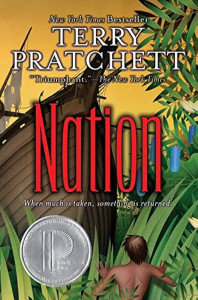 Terry Pratchett is now Sir Terry Pratchett, courtesy of the Queen’s New Year’s Honours List. He was knighted for “Services to Literature,” a grand and absolutely accurate reason. And if his enormous existing ouevre (and the amount of money it has brought to England) were not weighty enough to have accomplished this, Nation might just tip the scales all by itself. It may well be the best book Sir Terry has ever written.
Terry Pratchett is now Sir Terry Pratchett, courtesy of the Queen’s New Year’s Honours List. He was knighted for “Services to Literature,” a grand and absolutely accurate reason. And if his enormous existing ouevre (and the amount of money it has brought to England) were not weighty enough to have accomplished this, Nation might just tip the scales all by itself. It may well be the best book Sir Terry has ever written.
This is a story of worlds ending. Everyone’s world ends differently, but sometimes those endings overlap, forcing the survivors to join forces. Eventually, too, new worlds begin. They are seldom what we expect them to be, and the world’s ending usually reveals that that world wasn’t what we thought it was, either.
Mau is a boy on an isolated Pacific island, and on the verge of manhood. While he is away on Boys’ Island on the ceremonial vigil that is his rite of passage, a huge wave sweeps over his home island. He returns to find that everyone he knew is dead, and everything he knew is gone. There is no-one left to confirm his adulthood — there is no context left at all for his life or his existence. And after he buries the drowned bodies of everyone he loved, he is completely alone. Except for the voices of the Grandfathers . . . and the gods.
Daphne (her name is Ermintrude, but she hates it — and why keep a name you hate when the world ends?) is the sole survivor of a deadly shipwreck. She has a loving father (currently missing) for whom she has been searching; she has a socially predatory grandmother (who is also missing, having luckily been left behind in England). She too is alone, until she realizes she has been cast away on an island with one inhabitant: a boy, half-mad with grief and despair.
Together, Mau and Daphne form a society. It grows to encompass both their traditions and their fears; it also encompasses a growing number of variously damaged survivors of the wave from other islands, who come to view Daphne and Mau as their only hope. Mau and Daphne are each determined not to be forced into the molds of responsibility that their diverse pasts and their desperate present are demanding. But that wave is still sweeping over them. . . .
Mau is haunted by the voices of the Grandfathers, his ancestors long past, Daphne by the voice of her Grandmother, who is not long past enough . . . and each of them has a high destiny. It’s not the one they want, or get; and it is as inevitable as the over-arching wave that ended their old world and began the new.
This is a tremendous adventure story. It is terrifying, intriguing, despairing and funny. There are helpless survivors and raging cannibals, gods and ghosts, jolly tars with hearts of oak and pirates with no hearts at all. There is beer and a parrot. There are lost civilizations, disguised civilizations, new civilizations. Mau might be an ancient god-king, and Daphne might be Queen Victoria. But over all, this is a very real story, one that resonates with readers and draws them completely in. It’s founded on deep, scary human truths, and it’s wonderful.
Sir Terry is best known as a humorous author, and it is a fact that he is one of the funniest living writers in the English language. What is still sometimes overlooked by those who read his work for the sheer joy of laughter, is that he is a wise, compassionate humanist, a satirist of purest classical skill, and possesses a divinely clear-eyed view of the foibles and weaknesses of humanity. He is never afraid to take a situation to its most hilariously ridiculous extreme — nor to point out just how and why ordinary people become saints and monsters.
This ruthless honesty has always been most apparent in his works for children. Children are tougher than adults, and more aware that the world is both more beautiful and more horrible than we come to see it as grown-ups. Sir Terry honors that clear juvenile vision; his stories for the young are much stronger and more powerful than the mercifully watered-down tales he writes for their elders. They are good books: revelatory and immortal.
Nation is the best of that lot. Sir Terry says himself that it is the book he always wanted to write. I hope it gives him even half the satisfaction it gave to me, the reader. Your children need to read this book. And so do you — just have a short whiskey when you start, and you should survive the light it sheds.
(Harper Collins, 2008)
